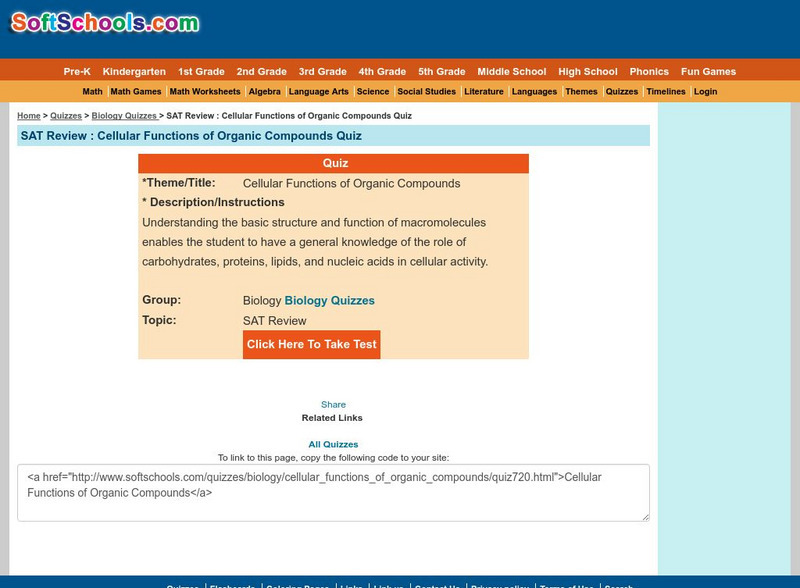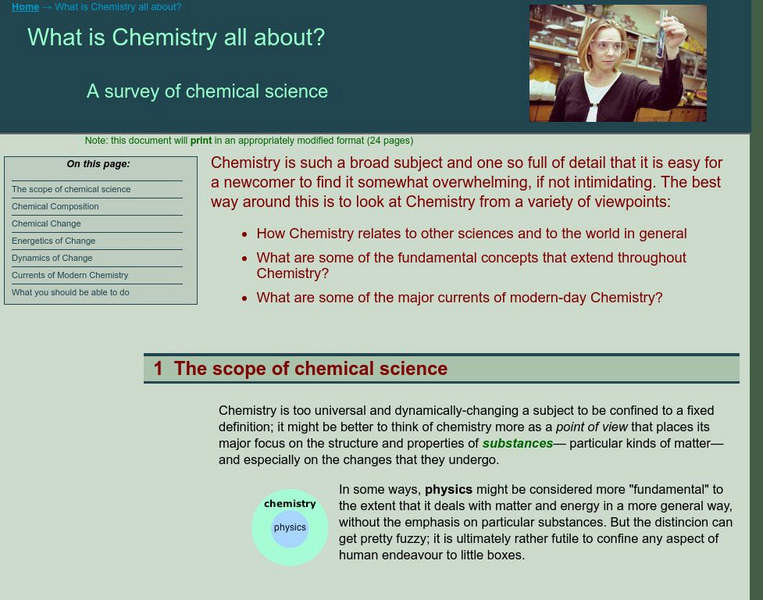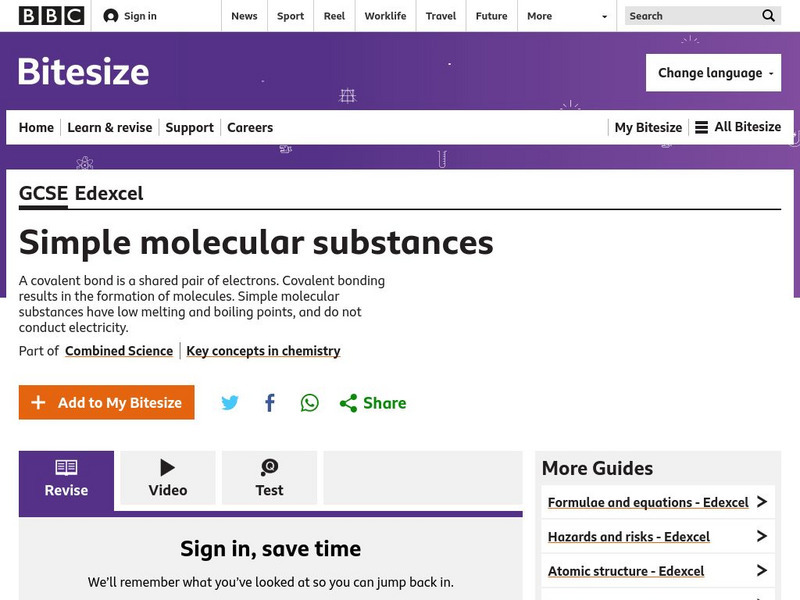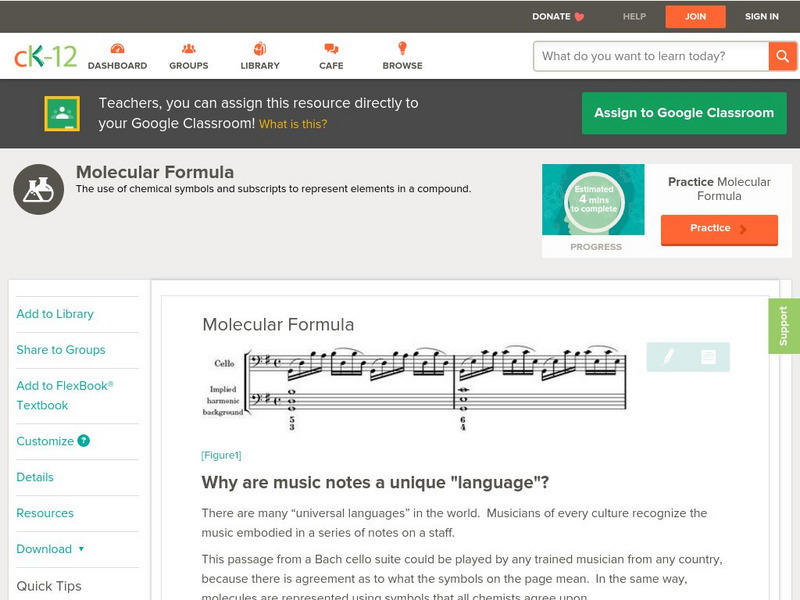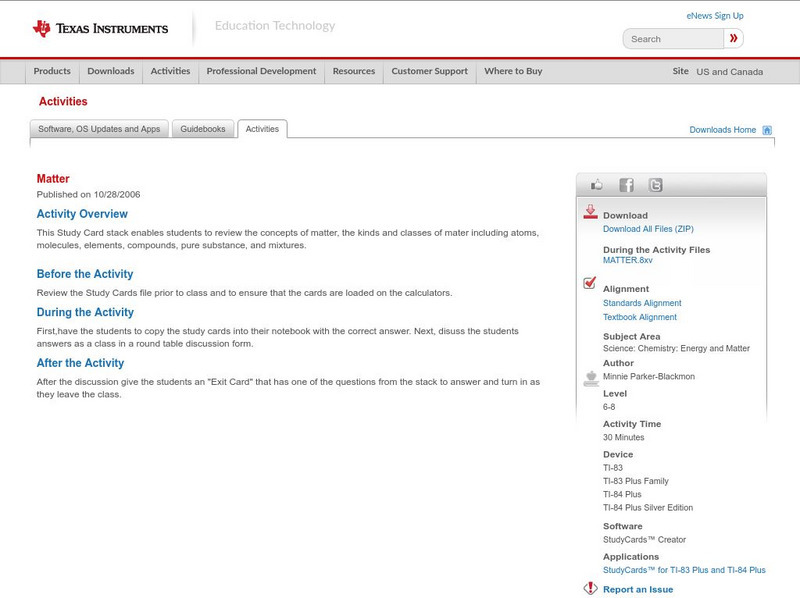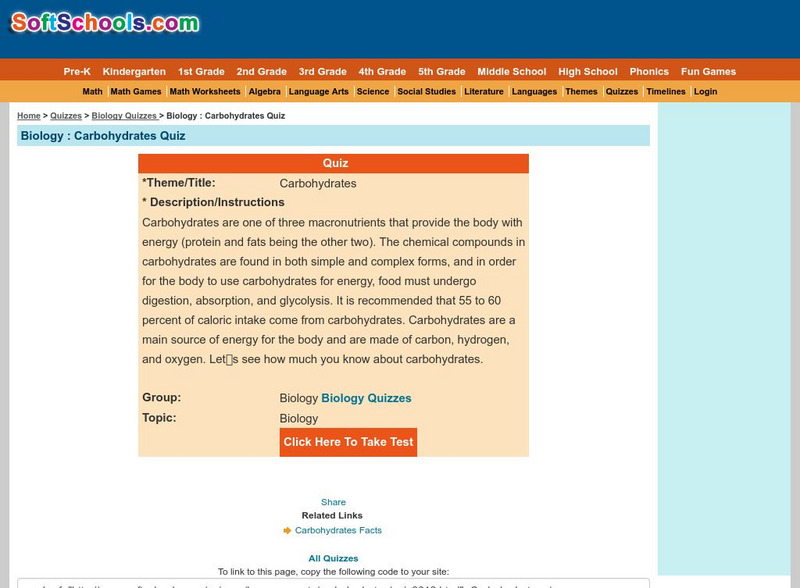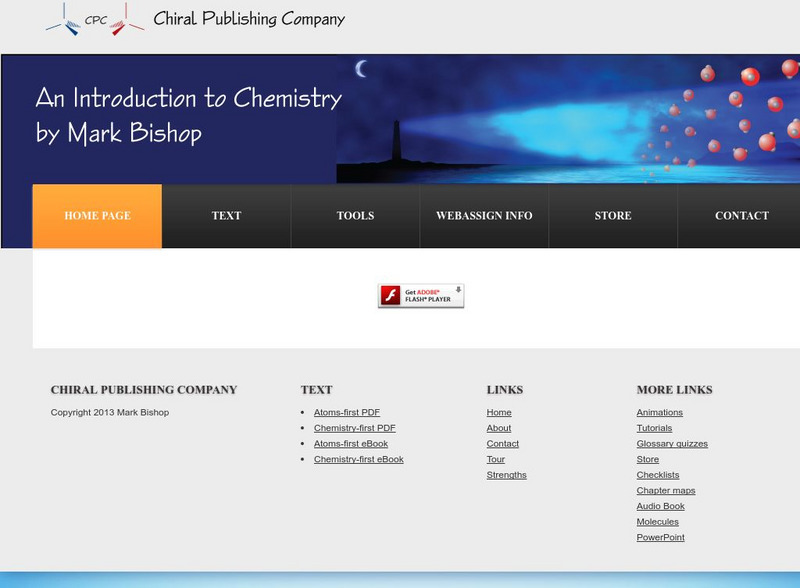Hi, what do you want to do?
Sophia Learning
Sophia: Structure and Function of Macromolecules: Carbohydrates
An introduction to the structure and function of the energy-rich molecules, carbohydrates.
ClassFlow
Class Flow: Compounds and Molecules
[Free Registration/Login Required] This flipchart introduces fifth graders to compounds and molecules. It is part of a large unit on matter. Key concepts include compounds, molecules, and chemical formulas. Opportunities for student...
Soft Schools
Soft Schools: Cellular Functions of Organic Compounds Quiz
Take an interactive quiz over organic compounds. After completing the quiz, check your score, and then revisit any incorrect question for further review.
American Chemical Society
Middle School Chemistry: Represent Bonding With Lewis Dot Diagrams
Students draw and interpret Lewis dot diagrams for individual atoms and both covalent and ionic compounds.
Simon Fraser University
Chem1 Virtual Textbook: What Is Chemistry All About?
Covering a range of eight topics related to chemistry, this resource provides a wealth of information complete with pictures, charts, graphs, and examples. Includes information on elements, compounds, atoms, molecules, structures,...
University of Alberta
The University of Alberta: Infrared Spectroscopy
Complete this interactive tutorial and learn about interpreting the infrared spectrum ("I" "R") that provides information about the functional groups in a molecule. Included are 12 labs and a quiz.
National Institutes of Health
Ncbi: The Molecular Biology of the Cell: The Chemical Components of a Cell
Advanced chapter of the book "The Molecular Biology of the Cell" describes and provides illustrations of our most current understanding of the chemical makeup of cells and their components. Explains in detail how electron activity keeps...
Chiral Publishing
Chiral Publishing: An Introduction to Chemistry: Binary Covalent Nomenclature Help
Learn everything you ever wanted to know about naming binary covalent compounds! See how scientists came up with systematic names for many common molecules and study the prefixes and roots for them.
ClassFlow
Class Flow: Comparing and Contrasting Matter
[Free Registration/Login Required] This flipchart is a guided activity to help students compare different types of matter: atoms and molecules, elements and compounds, mixtures and solutions. It corresponds to Virginia science SOL 5.4.
CK-12 Foundation
Ck 12: Fifth Grade Science: Physical Science: Types of Matter
[Free Registration/Login may be required to access all resource tools.] Discusses elements, atoms, compounds, molecules, and crystals. Looks at mixture and different types of them.
Simon Fraser University
Chem1 Virtual Textbook: Chemical Composition
Chemical composition is a section of a larger overview on Chemistry, covering a variety of aspects. This section focuses on elements, atoms, compounds, and structure. Examples, formulas, and pictures are provided.
BBC
Bbc: Gcse Bitesize: Covalent Bonds
A covalent bond is formed between non metal atoms, which combine together by sharing electrons. Covalent compounds have no free electrons and no ions so they don't conduct electricity.
CK-12 Foundation
Ck 12: Chemistry: Molecular Formula
[Free Registration/Login may be required to access all resource tools.] Defines molecular formula and describes how to write molecular formulas.
ClassFlow
Class Flow: What Is Matter?
[Free Registration/Login Required] Discover the composition of matter and the relationship between matter, atoms, and elements. Students will learn the differences between elements and compounds, and how molecules are formed. Chemical...
Simon Fraser University
Chem1 Virtual Textbook: Naming Chemical Substances
As part of the "Basic Atomics" section of the Virtual Textbook, this site examines basic chemical nomenclature and covers a variety of subjects related to chemical substances. Other topic covered include naming the elements, binary...
Georgia Department of Education
Ga Virtual Learning: Ap Biology: Chemistry of Life
Through informational text, interactive activities, animations, and video clips, students examine the chemistry of living things, and they learn how interactions from atoms are fundamental to life as we know it.
Other
Virtual Chembook: Density Applications With Gases
DENSITY is a physical property of matter, as each element and compound has a unique density associated with it. Density defined in a qualitative manner as the measure of the relative "heaviness" of objects with a constant volume. For...
Texas Instruments
Texas Instruments: Matter
This Study Card stack enables students to review the concepts of matter, the kinds and classes of mater including atoms, molecules, elements, compounds, pure substance, and mixtures.
Sophia Learning
Sophia: Characteristics of Matter
Find out the basic characteristics and main properties of all matter.
Soft Schools
Soft Schools: Carbohydrates Quiz
Take an interactive quiz over carbohydrates. After completing the quiz, check your score, and then revisit any incorrect question for further review
CK-12 Foundation
Ck 12: Chemistry Simulation: Air Matters
[Free Registration/Login Required] Explore the composition of air and learn about the different atoms and molecules that we breathe every day.
CK-12 Foundation
Ck 12: General Chemistry
[Free Registration/Login may be required to access all resource tools.] Students will be introduced to some of the basic concepts of chemistry.
Chiral Publishing
Chiral Publishing: An Introduction to Chemistry: Types of Substances
Practice classifying substances using this fun, interactive exercise. Get either the formulas or names of substances, and decide which type of compound it is.
Other
Science Alive: Synthetic vs. Natural: What's the Difference?
Through this reading, students will learn that a substance's properties arise from its molecular structure, not from how it's made (i.e., synthesized by people or found in nature). There is no fundamental difference between natural and...







